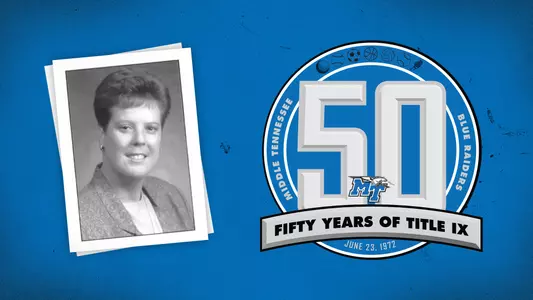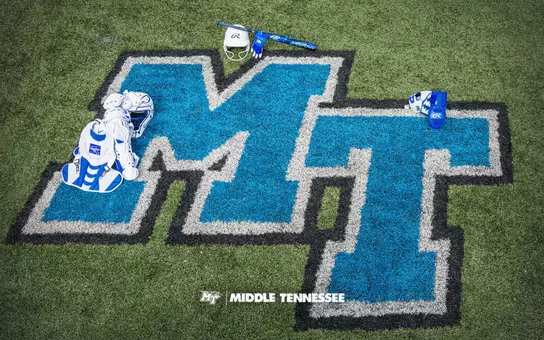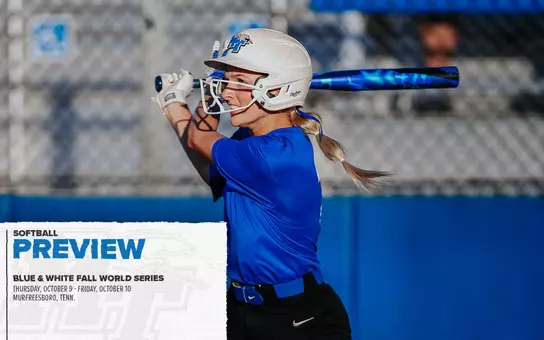Middle Tennessee State University Athletics

#TitleIX50: Blue Raider Softball's Karen Green
4/30/2023 12:15:00 PM | Softball, BRAA
Throughout my life, I've always thought of myself as an educator and have always worked in and around education. At the root of it, that's exactly what being a coach is. You must take any and every opportunity to impact others' lives by enriching them through education. There, of course, are many different avenues to do that, but I was blessed to spend my career doing it through softball. Had it not been for Title IX, I don't think softball becomes a major sport either at the high school or college level.
Softball was growing in popularity, and when I started, it was a great time to get into the sport. I think when it became an Olympic sport, it helped grow the game and move it further east. My first job was helping start the program at Davidson Academy. We played off campus at parks, and in my three years there, crowds began to grow. We used to drive in vans to games, and I can remember having to use bungie cords to keep the door from sliding open on the road!
We got up early and stayed up late, driving home after games and teaching all day. But nobody from those years would trade any of it. We all had a blast, and it was all we knew. I just don't know that any of this would've come into existence without Title IX. Pat Summitt told stories of having to drive players to games in the van, too. Title IX not only affected softball, but all of women's athletics. We all were learning in those early days how to adapt and make the most of what we had.
I spent a year at Belmont starting its program and, at the time, we were an NAIA school, so there wasn't nearly as many rules as NCAA institutions had. But, same thing, we were just excited to play the game. Those first couple of years at Davidson Academy and Belmont taught me and helped prepare me by giving me the gift of learning! Without being a good learner and taking time to adapt to certain situations, you won't become a great teacher.
When MTSU started its program in 1993, I got the call and became the program's first coach. One of my first days on campus, I'll never forget when Dean Hayes handed me a giant manual and said, "Study up, you're gonna take a test this afternoon from the NCAA, and you have to pass it to go recruiting."
At MTSU, we started Samsonite Park and played our games at McKnight Park. We eventually got our own field, but even without it I thought I'd died and went to heaven because I had my first full-time assistant, and we also had a graduate assistant. It allowed us to really take more of a hands-on approach and have a lot more one-on-one time with the girls and not only help them on the field but help develop them off the field because I had more eyes and ears to help me with the culture we were trying to build.
I pushed our players hard in conditioning, and we all strived to be organized and have purpose behind all we did. We used to do three-mile runs. Players hated it at the time. I still run into some of my girls today who talk about it and how hard it was. The point behind it, though, was this: you're not ever going to run three miles in a softball game. The reason we did it was to prove to the girls and teach them that if they didn't give up and kept fighting, they could accomplish anything. That value was at the core of our team and helped build them to not only be great players, but great women and leaders in our community after they graduated.
When I played, I had great coaches that taught me about discipline and grit and to never give up. Those lessons meant a lot to me personally, and I think our girls really took it to heart. Showing the rest of the world that we were serious and were talented really helped us get to the point to where we had a fully funded program.
One of my first requests was to be able to recruit not just locally, but nationally. Some of the girls that have come from all parts of the country are still here in Murfreesboro and the surrounding areas. A great example of that is from here in these past couple of years. I worked at Independence High School in Thompson's Station, Tennessee, and when I was new, I went to introduce myself to one of our principals at a football game. I walked up and smiled and shook her hand and said, "I'm Karen Green." She wouldn't look at me at first and muttered, "I know who you are," and just went silent for a second. I asked, "Is that a good thing or a bad thing?" She told me "I was the little girl in your stands watching every one of your MTSU practices." Right there, I thought 'You never knew who you were influencing at that time.' She said, "I loved your discipline, I loved your organization." I felt like we not only were teaching just our players, but we were teaching a whole generation of young ladies that they could accomplish anything in their careers.
On the field, of course, there was always still teachable moments for me, because as I said earlier, you must constantly be learning to be a great teacher. Title IX being in existence gave me the opportunity to interact and form relationships with young ladies that I think impacted me more than I impacted them.
I hate singling out players, because I had so many, but one of the greatest lessons I learned was from an undersized catcher named Melanie Manley. We used to have open tryouts, and I can remember her showing up to these and wanting to play for us so badly. Because of her size, I at first turned her down. I didn't think she'd hold up physically.
I went to camps and was an instructor at these camps throughout the summers. Every camp I was at, she was there. She was winning MVP awards over pools of sometimes 600 players. Finally, I asked who she was, and when she told me, I almost fell out on the floor. I called her one day and said, "I'm a big enough woman to admit when I make a mistake, and I'd like for you to come to MTSU."
She taught me that sometimes, the intangibles don't always matter. It was a perfect example of the fight in the dog not the dog in the fight. We had so many girls in those early years before her that made a tremendous impact, too.
Jennifer Martinez, Andrea Edwards, Ashley Brown, Steffi Silva, just to name a few. Andrea came with me to Belmont, and we still ask each other to this day who followed who. We spent more time with each other than we did with our own families. We were family, and we taught each other that family does whatever they have to do to take care of each other.
Eventually, we won a conference title and were able to play in a regional in Arizona against Jennie Finch. I'll never forget stepping off the bus with the girls and seeing all the TV cameras and just being able to soak up the moment. I think that's when I realized that everything we worked so hard for throughout the years was finally starting to come to fruition. It meant so much to me because I knew how much it meant to the girls. I think that entire experience taught us all to remain humble but also just to enjoy life with family. That was a once-in-a-lifetime experience and one that I hold near and dear to my heart.
Following the 2001 season, I decided to step away from the college game and went to Siegel High School here in town. Nowadays, seeing the game of softball evolve and become what it is now thanks to the major impact that Title IX has had makes me happy. As a coach, and with anything in life, one of the greatest lessons I like to teach is that you always want to leave a place in a better position to succeed from when you were there. Always move onward and upward. To see MTSU's softball team continue to do that is just amazing to me. I remember when current Head Coach Jeff Breeden took over, he called and asked me for one piece of advice, and I told him "Pack a bag in February and you won't have to unpack it until May." Several years later when he asked me about it, he told me I thought I was kidding. It was funny to think about, because even with girls having new cleats and gloves and bats readily available along with nice charter buses and the advancements in technology, it was a great reminder that at the root of it, softball has always been the same game.
It teaches you that even if you fail, you try and try again. If you have success three out of every ten times you hit, you're considered a pretty darn good player.
Without Title IX, I don't think softball would be where it is today. I don't think I'd be who I am today. I don't think the many girls I was blessed to play with and coach would be who they are today. Title IX not only molded the girls but molded me as a coach.
The old saying goes, "Life has no remote, get up and change it yourself."
If you believe strongly in something, you're going to stand up and fight for it, even if you get knocked down. What better way to teach that than softball? I think that's what Title IX did for us. It's helped all of us as coaches, players and administrators to mold better women.
Softball was growing in popularity, and when I started, it was a great time to get into the sport. I think when it became an Olympic sport, it helped grow the game and move it further east. My first job was helping start the program at Davidson Academy. We played off campus at parks, and in my three years there, crowds began to grow. We used to drive in vans to games, and I can remember having to use bungie cords to keep the door from sliding open on the road!
We got up early and stayed up late, driving home after games and teaching all day. But nobody from those years would trade any of it. We all had a blast, and it was all we knew. I just don't know that any of this would've come into existence without Title IX. Pat Summitt told stories of having to drive players to games in the van, too. Title IX not only affected softball, but all of women's athletics. We all were learning in those early days how to adapt and make the most of what we had.
I spent a year at Belmont starting its program and, at the time, we were an NAIA school, so there wasn't nearly as many rules as NCAA institutions had. But, same thing, we were just excited to play the game. Those first couple of years at Davidson Academy and Belmont taught me and helped prepare me by giving me the gift of learning! Without being a good learner and taking time to adapt to certain situations, you won't become a great teacher.
When MTSU started its program in 1993, I got the call and became the program's first coach. One of my first days on campus, I'll never forget when Dean Hayes handed me a giant manual and said, "Study up, you're gonna take a test this afternoon from the NCAA, and you have to pass it to go recruiting."
At MTSU, we started Samsonite Park and played our games at McKnight Park. We eventually got our own field, but even without it I thought I'd died and went to heaven because I had my first full-time assistant, and we also had a graduate assistant. It allowed us to really take more of a hands-on approach and have a lot more one-on-one time with the girls and not only help them on the field but help develop them off the field because I had more eyes and ears to help me with the culture we were trying to build.
I pushed our players hard in conditioning, and we all strived to be organized and have purpose behind all we did. We used to do three-mile runs. Players hated it at the time. I still run into some of my girls today who talk about it and how hard it was. The point behind it, though, was this: you're not ever going to run three miles in a softball game. The reason we did it was to prove to the girls and teach them that if they didn't give up and kept fighting, they could accomplish anything. That value was at the core of our team and helped build them to not only be great players, but great women and leaders in our community after they graduated.
When I played, I had great coaches that taught me about discipline and grit and to never give up. Those lessons meant a lot to me personally, and I think our girls really took it to heart. Showing the rest of the world that we were serious and were talented really helped us get to the point to where we had a fully funded program.
One of my first requests was to be able to recruit not just locally, but nationally. Some of the girls that have come from all parts of the country are still here in Murfreesboro and the surrounding areas. A great example of that is from here in these past couple of years. I worked at Independence High School in Thompson's Station, Tennessee, and when I was new, I went to introduce myself to one of our principals at a football game. I walked up and smiled and shook her hand and said, "I'm Karen Green." She wouldn't look at me at first and muttered, "I know who you are," and just went silent for a second. I asked, "Is that a good thing or a bad thing?" She told me "I was the little girl in your stands watching every one of your MTSU practices." Right there, I thought 'You never knew who you were influencing at that time.' She said, "I loved your discipline, I loved your organization." I felt like we not only were teaching just our players, but we were teaching a whole generation of young ladies that they could accomplish anything in their careers.
On the field, of course, there was always still teachable moments for me, because as I said earlier, you must constantly be learning to be a great teacher. Title IX being in existence gave me the opportunity to interact and form relationships with young ladies that I think impacted me more than I impacted them.
I hate singling out players, because I had so many, but one of the greatest lessons I learned was from an undersized catcher named Melanie Manley. We used to have open tryouts, and I can remember her showing up to these and wanting to play for us so badly. Because of her size, I at first turned her down. I didn't think she'd hold up physically.
I went to camps and was an instructor at these camps throughout the summers. Every camp I was at, she was there. She was winning MVP awards over pools of sometimes 600 players. Finally, I asked who she was, and when she told me, I almost fell out on the floor. I called her one day and said, "I'm a big enough woman to admit when I make a mistake, and I'd like for you to come to MTSU."
She taught me that sometimes, the intangibles don't always matter. It was a perfect example of the fight in the dog not the dog in the fight. We had so many girls in those early years before her that made a tremendous impact, too.
Jennifer Martinez, Andrea Edwards, Ashley Brown, Steffi Silva, just to name a few. Andrea came with me to Belmont, and we still ask each other to this day who followed who. We spent more time with each other than we did with our own families. We were family, and we taught each other that family does whatever they have to do to take care of each other.
Eventually, we won a conference title and were able to play in a regional in Arizona against Jennie Finch. I'll never forget stepping off the bus with the girls and seeing all the TV cameras and just being able to soak up the moment. I think that's when I realized that everything we worked so hard for throughout the years was finally starting to come to fruition. It meant so much to me because I knew how much it meant to the girls. I think that entire experience taught us all to remain humble but also just to enjoy life with family. That was a once-in-a-lifetime experience and one that I hold near and dear to my heart.
Following the 2001 season, I decided to step away from the college game and went to Siegel High School here in town. Nowadays, seeing the game of softball evolve and become what it is now thanks to the major impact that Title IX has had makes me happy. As a coach, and with anything in life, one of the greatest lessons I like to teach is that you always want to leave a place in a better position to succeed from when you were there. Always move onward and upward. To see MTSU's softball team continue to do that is just amazing to me. I remember when current Head Coach Jeff Breeden took over, he called and asked me for one piece of advice, and I told him "Pack a bag in February and you won't have to unpack it until May." Several years later when he asked me about it, he told me I thought I was kidding. It was funny to think about, because even with girls having new cleats and gloves and bats readily available along with nice charter buses and the advancements in technology, it was a great reminder that at the root of it, softball has always been the same game.
It teaches you that even if you fail, you try and try again. If you have success three out of every ten times you hit, you're considered a pretty darn good player.
Without Title IX, I don't think softball would be where it is today. I don't think I'd be who I am today. I don't think the many girls I was blessed to play with and coach would be who they are today. Title IX not only molded the girls but molded me as a coach.
The old saying goes, "Life has no remote, get up and change it yourself."
If you believe strongly in something, you're going to stand up and fight for it, even if you get knocked down. What better way to teach that than softball? I think that's what Title IX did for us. It's helped all of us as coaches, players and administrators to mold better women.
Facility tour – Stephen and Denise Smith Student-Athlete Performance Center
Wednesday, July 30
Spring Sports Show hosted by The Boulevard – April 21, 2025: Softball and Baseball
Monday, April 21
MTSU Softball vs WKU Recap 4/11-13/25
Monday, April 14
MTSU Softball vs WKU Recap 4/11-13/25 2025
Monday, April 14


















